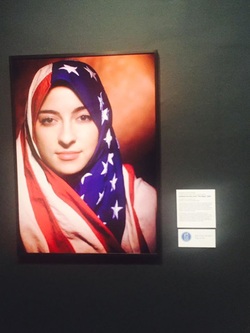
“Use your time at the National Museum of Women in the Arts to think about your capstone,” said Jaime Horn, Director of ALI. To be honest my capstone project was the last thing on my mind. We were in the midst of preparing for our group policy memo presentation to the Office of Global Women’s Issues at the U.S. Department of State. We had been working diligently on our proposal: how female empowerment can counter violent extremism in Libya, Tunisia, Kosovo, Bangladesh, and Somalia.
We each chose these countries for various reasons. Mergime, or Maggie as we called her endearingly, was passionate about advocating for women’s economic empowerment for her native Kosovo. She reminded us that, though Kosovo was no longer a war-torn country, the conflict had a lasting negative effect on gender equality in the country. Similarly, Farah A. (we had three Farahs in our group!), told us about how women in the Middle East faced gender disparities in various aspects of their life as well. As someone currently living through conflict in Libya, she would know. Kenzie spoke about the importance of including Africa after having studied abroad in Rwanda. Agreeing with Kenzie, Caroline explained the realities of preventing violent extremism in Africa, drawing on her academic background in security studies.
We were in a completely different mindset, but we all decided to take a break from the mentally draining memo-writing process and headed to the museum to find inspiration for our capstone. As I walked around the museum, I came across an exhibit called ‘Rawiya,’ which is Arabic for ‘she who tells a story.’ The exhibition displayed various stories of women in the Middle East. Stories of bravery, frustration, anguish, love, and hope. It wasn’t until I came across Boushra Almutawakel’s “The Hijab” series that I felt a deep sense of connection and, in ways I hadn’t expected, affliction. One photograph in particular struck a chord of with me. But it also made me question my sense of self.
During earlier dialogue sessions, we were challenged to question our identities; how do I use my identity to make the world a better place through the work I do? For me, this question stems from a deeply personal place, one in which I feel guilty for all that I have been given in my life and conflicted by a society that has put limits on various aspects of my identity.
My parents immigrated to the United States from Pakistan. My mother was brought up in a single parent household, where she mostly worked and completed only some of her college education. My father came here with limited resources. At one point of his life, he was working three jobs, living in his car, and getting ready at McDonald’s. They have never framed their struggles as sacrifices, but through their stories I know just how much they had to give up to make sure that my younger sister and I lived a better life; a life in which we pursued our dreams and passions without restrictions. So yes, I feel guilty because I have always received the support of my loving parents in every way possible.
At the same time, I feel conflicted because of the negative political rhetoric being showcased in this election cycle. Why is my potential suddenly being determined by my identity? Suddenly, being female, Muslim, and the daughter of immigrant parents may matter more than what I can offer to society. My parents did not come to America so I could be limited; they came here so I could fly above every ceiling and realize dreams unavailable to them.
So, here I was, staring at a photograph of an American-Muslim, like me, with the American flag as her hijab design; and the photograph was staring right back to me. I may be all of the things I described above, but most importantly and above all, I am an American. It shouldn’t be a challenge for me to imagine how I fit into society.
After staring at the photograph, Farah M., my dear friend who happens to be Lebanese-American, stood next to me staring at the powerful photograph too. Then, Maggie came. Then Kenzie. Then Farah A. Then Caroline. This photograph spoke volumes to all of us. In some way it spoke to the ways we all were conflicted, confined, or challenged by our societies because of our identities. Because of our gender.
Just look at the statistics. Only 57% of women in the U.S. participate in the labor force according to the U.S. Department of Labor. In 2014, the Center for American Progress reported that only 4.6% of Fortune 500 CEOs were women. Women of color in the U.S. occupy only 11.9% of managerial and professional positions. Of course this is not a challenge unique to American women. In South Asia, child marriage abounds. Young women lack access to education in many parts of the world. In Ethiopia, women are still struggling for reproductive health and rights. Gender-based violence continues to occur, especially in countries engaged in conflict.
I am tired of being a statistic. I refuse to be bound by gender roles defined by history. If we continue to follow statistical trends, progress will never occur. Not here in the U.S. Not anywhere.
The Andi Leadership Institute (ALI) fellowship program has not only allowed me to look critically at these questions regarding my identity or to seek answers to why women continue to face inequalities around the world. ALI has also afforded me the opportunity to discuss these issues openly with a community of strong young women and given me the tools to put my thoughts into concrete action. Whether that action manifests in the form of becoming a public servant for the rest of my life, carrying out the vision outlined in my capstone project, or encouraging or inspiring other young women to make a difference in their community, I know that I absolutely cannot be a bystander.
ALI has taught me that only through dialogue and discussion can ideas be exchanged and change achieved. When there is open and honest communication, words turn into action and inequities cease to exist.
Along with these lessons, I learned the importance of being relentlessly authentic. I learned to “never let them see you sweat,” a maxim from a 1980s Dove deodorant commercial that MSNBC anchor Rachel Maddow shared as her greatest advice to us. I learned the greatest feats in life can only be overcome with the support of a community.
This supportive community of ALI fellows are my now dearest friends. I learned cultural empathy and understanding can be achieved by things as simple as searching for a place to eat in DuPont Square together to sweating in a cycling class together, or waiting in line for Baked and Wired cupcakes together. (And yes, we love food!)
During this fellowship, we saw ‘herstory’ made when Hillary Clinton became the first woman to receive the presidential nomination of a major party in the United States. As I look into a future which includes my country led by a woman, I think back to that photograph hanging in the Rawiya exhibit. That photograph makes a statement about the importance being confident in who you are as a person and about voicing what matters to you. Transformative female leadership, to me, comes at different levels and in various forms. It can come in the form of political leadership, or in the form of human rights activism. In the form of slam poetry, or in the form of a powerful photograph by a female photographer.
I’m struck by the realization that categories only diminish true potential. To me, Farah A., Caroline, Farah M., Kenzie, and Maggie are not just women from different walks of life, different cultures, or different backgrounds. They are my friends before anything society confines them to be. They are strong. They are independent. They are my community. Limiting the female voice will only lead to wondering what could’ve been, when there are better questions we should be asking… Why not us? Why not now? Why not together?
Only time will determine how my story will unfold. I am grateful to ALI for bringing me one step closer to becoming rawiya through its values of community, cultural empathy and understanding, and global women’s leadership.
What I do know for sure is that I am irreversibly on the path of becoming rawiya; a woman who tells her story proudly and boldly.
We each chose these countries for various reasons. Mergime, or Maggie as we called her endearingly, was passionate about advocating for women’s economic empowerment for her native Kosovo. She reminded us that, though Kosovo was no longer a war-torn country, the conflict had a lasting negative effect on gender equality in the country. Similarly, Farah A. (we had three Farahs in our group!), told us about how women in the Middle East faced gender disparities in various aspects of their life as well. As someone currently living through conflict in Libya, she would know. Kenzie spoke about the importance of including Africa after having studied abroad in Rwanda. Agreeing with Kenzie, Caroline explained the realities of preventing violent extremism in Africa, drawing on her academic background in security studies.
We were in a completely different mindset, but we all decided to take a break from the mentally draining memo-writing process and headed to the museum to find inspiration for our capstone. As I walked around the museum, I came across an exhibit called ‘Rawiya,’ which is Arabic for ‘she who tells a story.’ The exhibition displayed various stories of women in the Middle East. Stories of bravery, frustration, anguish, love, and hope. It wasn’t until I came across Boushra Almutawakel’s “The Hijab” series that I felt a deep sense of connection and, in ways I hadn’t expected, affliction. One photograph in particular struck a chord of with me. But it also made me question my sense of self.
During earlier dialogue sessions, we were challenged to question our identities; how do I use my identity to make the world a better place through the work I do? For me, this question stems from a deeply personal place, one in which I feel guilty for all that I have been given in my life and conflicted by a society that has put limits on various aspects of my identity.
My parents immigrated to the United States from Pakistan. My mother was brought up in a single parent household, where she mostly worked and completed only some of her college education. My father came here with limited resources. At one point of his life, he was working three jobs, living in his car, and getting ready at McDonald’s. They have never framed their struggles as sacrifices, but through their stories I know just how much they had to give up to make sure that my younger sister and I lived a better life; a life in which we pursued our dreams and passions without restrictions. So yes, I feel guilty because I have always received the support of my loving parents in every way possible.
At the same time, I feel conflicted because of the negative political rhetoric being showcased in this election cycle. Why is my potential suddenly being determined by my identity? Suddenly, being female, Muslim, and the daughter of immigrant parents may matter more than what I can offer to society. My parents did not come to America so I could be limited; they came here so I could fly above every ceiling and realize dreams unavailable to them.
So, here I was, staring at a photograph of an American-Muslim, like me, with the American flag as her hijab design; and the photograph was staring right back to me. I may be all of the things I described above, but most importantly and above all, I am an American. It shouldn’t be a challenge for me to imagine how I fit into society.
After staring at the photograph, Farah M., my dear friend who happens to be Lebanese-American, stood next to me staring at the powerful photograph too. Then, Maggie came. Then Kenzie. Then Farah A. Then Caroline. This photograph spoke volumes to all of us. In some way it spoke to the ways we all were conflicted, confined, or challenged by our societies because of our identities. Because of our gender.
Just look at the statistics. Only 57% of women in the U.S. participate in the labor force according to the U.S. Department of Labor. In 2014, the Center for American Progress reported that only 4.6% of Fortune 500 CEOs were women. Women of color in the U.S. occupy only 11.9% of managerial and professional positions. Of course this is not a challenge unique to American women. In South Asia, child marriage abounds. Young women lack access to education in many parts of the world. In Ethiopia, women are still struggling for reproductive health and rights. Gender-based violence continues to occur, especially in countries engaged in conflict.
I am tired of being a statistic. I refuse to be bound by gender roles defined by history. If we continue to follow statistical trends, progress will never occur. Not here in the U.S. Not anywhere.
The Andi Leadership Institute (ALI) fellowship program has not only allowed me to look critically at these questions regarding my identity or to seek answers to why women continue to face inequalities around the world. ALI has also afforded me the opportunity to discuss these issues openly with a community of strong young women and given me the tools to put my thoughts into concrete action. Whether that action manifests in the form of becoming a public servant for the rest of my life, carrying out the vision outlined in my capstone project, or encouraging or inspiring other young women to make a difference in their community, I know that I absolutely cannot be a bystander.
ALI has taught me that only through dialogue and discussion can ideas be exchanged and change achieved. When there is open and honest communication, words turn into action and inequities cease to exist.
Along with these lessons, I learned the importance of being relentlessly authentic. I learned to “never let them see you sweat,” a maxim from a 1980s Dove deodorant commercial that MSNBC anchor Rachel Maddow shared as her greatest advice to us. I learned the greatest feats in life can only be overcome with the support of a community.
This supportive community of ALI fellows are my now dearest friends. I learned cultural empathy and understanding can be achieved by things as simple as searching for a place to eat in DuPont Square together to sweating in a cycling class together, or waiting in line for Baked and Wired cupcakes together. (And yes, we love food!)
During this fellowship, we saw ‘herstory’ made when Hillary Clinton became the first woman to receive the presidential nomination of a major party in the United States. As I look into a future which includes my country led by a woman, I think back to that photograph hanging in the Rawiya exhibit. That photograph makes a statement about the importance being confident in who you are as a person and about voicing what matters to you. Transformative female leadership, to me, comes at different levels and in various forms. It can come in the form of political leadership, or in the form of human rights activism. In the form of slam poetry, or in the form of a powerful photograph by a female photographer.
I’m struck by the realization that categories only diminish true potential. To me, Farah A., Caroline, Farah M., Kenzie, and Maggie are not just women from different walks of life, different cultures, or different backgrounds. They are my friends before anything society confines them to be. They are strong. They are independent. They are my community. Limiting the female voice will only lead to wondering what could’ve been, when there are better questions we should be asking… Why not us? Why not now? Why not together?
Only time will determine how my story will unfold. I am grateful to ALI for bringing me one step closer to becoming rawiya through its values of community, cultural empathy and understanding, and global women’s leadership.
What I do know for sure is that I am irreversibly on the path of becoming rawiya; a woman who tells her story proudly and boldly.
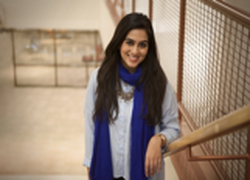
Nausheen is a 2016 ALI Fellow and a recentgraduate of the School of International Service (SIS) at American University, where she double majored in International and Asian Studies. In spring 2015, Nausheen studied abroad in Istanbul, Turkey, where she created maternal hygiene packages for Syrian refugee women. She plans to work on peacebuilding initiatives that strengthen governance and effectively engage civil society, particularly women and youth, in regions of conflict.

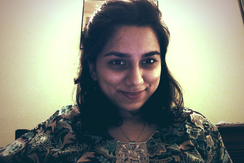
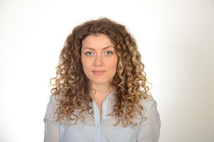
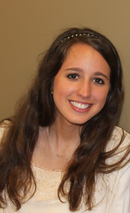
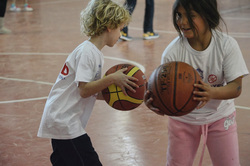
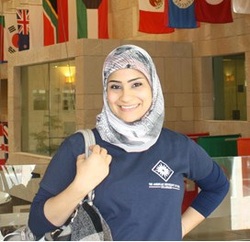
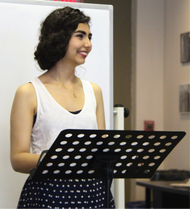
 RSS Feed
RSS Feed